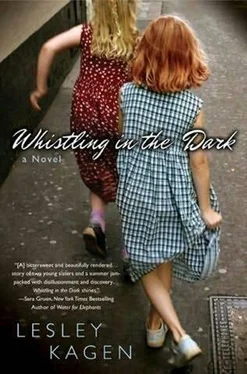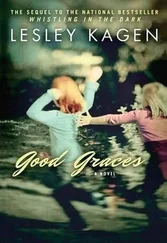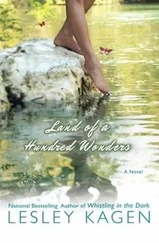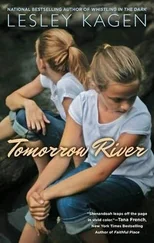All of us got a partner when Johnny Fazio sang the last song of the night called “That’s Amore,” which Nana Fazio told me was Italian for love and was certainly the right song to sing because there sure was a lot of love dancing going on. Including me and Henry Fitzpatrick, who gave me my first on the lips smooch after we got done with the box-step waltz. His lips tasted like black licorice, which I never liked, but the rest of it wasn’t half bad.
Seeing us all there like that, I thought of how much my lush daddy would’ve loved the party. I wished he was there. If he was, I knew he woulda given me two thumbs up. And when I tried to say, “I’m sorry for saying what I said…,” he would just hug me close with his tan hairy arms and tell me he knew I hadn’t meant those awful things I said on the day of the crash. And how proud he was of me for doing what he had asked me to do. Keep my promises. Tend my garden.
After the party was all over, the Vliet Street kids called to each other, “See ya tomorrow at school.” I walked home by myself, gazing up at the great beyond, thinking about how love never really dies. It’s always out there, leaving a twinkling trail to another place where you can go and rest when you need to forget that things really do happen when you least expect them. And sometimes, those things can change your life forever. But what Daddy hadn’t gotten around to telling me, and what I figured out that night all by myself, was that no matter what horrible things happen… you have to go on with your life with all the stick-to-itiveness that you can muster up.
So with the fireflies flashing and the chocolate chip cookies smelling and the Moriaritys’ dog barking two streets over, I sat down on the O’Haras’ front steps and looked up and said in my most certain voice, “To the clear blue of the western sky, it’s me, Sal your gal, telling my Sky King, my magnificent Sky King… roger, wilco and out.”

Lesley Kagenis a writer, actress, voice-over talent, and restaurateur. The owner of Restaurant Hama, one of Milwaukee’s top restaurants, Ms. Kagen lives with her husband and two children in Mequon, Wisconsin. Visit her Web site at www.lesleykagen.com.
This Conversation Guide is intended to enrich the individual reading experience, as well as encourage us to explore these topics together-because books, and life, are meant for sharing.
CONVERSATION GUIDE
A CONVERSATION WITH LESLEY KAGEN
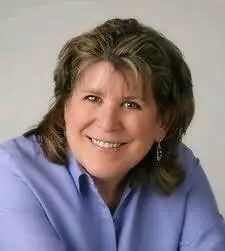
Q. Whistling in the Dark is set in Milwaukee. Did you grow up there?
A. Yup. I grew up on the west side in a neighborhood that had the same sort of feel Vliet Street does. Irish and German Catholic families jammed into duplexes. A cadre of kids playing kick the can or red light, green light when the streetlights came on. It was a wonderful setting for a childhood. As an adult, I’ve lived in New York, Los Angeles and Chicago, but I brought my children back to Milwaukee to raise them. I think it might’ve been an attempt on my part to recapture the flavors of my childhood. Especially that Bavarian cream-filled coffee cake.
Q. The book is set in the summer of 1959. I’m wondering about authenticity. May I ask how old you are?
A. I was ten in 1959. That makes me thirty-nine.
Q. Actually, that makes you fifty-seven.
A. Oh.
Q. Where did you get the idea for the book?
A. I think we all reach a point in our lives when our childhood memories become old friends we would just love to hang out with again. I don’t think for a minute that I am the only woman on the planet who has become overwhelmed with the pace of life nowadays. I began to yearn for summers on the stoop. Cherry Popsicles. Secret hiding places. My sister snoring softly beside me. I needed to experience those feelings again.
Q. How much of this story is based on real-life experience?
A. Quite a bit. My father was killed in a car accident when I was four. Left penniless, my mother quickly remarried to a man who, while not a drunken sot, did share other personality traits with Hall. My mother almost died of a staph infection when I was ten, leaving us girls essentially on our own while she recovered in the hospital. I have two sisters. Sally is based on my younger sister, Ellie. Nell is modeled after my older sister, Ronney. And Troo and I have quite a bit in common.
Q. I was quite taken by the dichotomy of the time period. There was such innocence and yet…
A. Exactly. While talking to other women my age about their memories, so many of them remembered jumping double Dutch and Fabian and cloud watching and all those sorts of dreamy good times. But inevitably they’d pause, and shyly mention being flashed by their next-door neighbor. Or an older brother’s nighttime visitations. Or an uncle who may have touched them in a certain way. So many of those traumas were swept under the fifties carpet. Children, especially girl children, have more value now. Thank God.
Q. My heart went out to the girls’ mother. She was a victim of the times as well.
A. I don’t know if that has changed all that much. I know many women still feel trapped in loveless marriages. They’re simply too afraid to leave, unsure if they can provide for their children, for themselves.
Q. Who is your favorite character in the novel?
A. That’s like asking who my favorite child is.
Q. Okay, how about your least favorite character in the novel.
A. That’s like asking who my least favorite child is.
Q. Give it a shot.
A. I am quite fond of Sally. Her unflagging sweetness. Her deep-seated sense of responsibility. And her desperate need to protect Troo. I find these winning qualities. On the flip side, I like Hall the least. Of course, Bobby is de le, but Hall abandoned two small girls who needed tender loving care.
Q. Ethel is a wonderful character. Why did you introduce a Southern Baptist woman into fifties Milwaukee?
A. Because she deserved to be there and wasn’t. Not unlike today, Milwaukee in the fifties was a very segregated city. The only time I would see someone of color was on our way to the beach, when we drove through the Core. Until the summer I was thirteen, and my stepfather brought home an eighteen-year-old kid to mow the lawn. I was stunned. The enamel blackness of his skin, his bouncy natty hair. Teddy’s mere presence in our backyard stirred me in a truly elemental way. That electric smile of his, the one that promised a girl could get into a little trouble if she wanted to? My oh my. What were you saying?
Q. Ethel?
A. Oh, yeah. I love Ethel. She has that no-nonsense, I’m gonna run you ragged, but only because I love you to death Southern sensibility about her. I adore that. Always have. I think it all goes back to my utter idolization of Gregory Peck as Atticus Finch in To Kill a Mockingbird . When your father dies when you are young, a girl looks for a replacement. He was mine.
Q. This is your first novel. What took you so long?
A. My award-winning fourth-grade poem, “I Am the Sun,” is hanging in my daughter’s room. I followed up that early success by writing a script for 77 Sunset Strip when I was eleven. I am still waiting for my royalties. I studied writing in college and wrote ad copy for years. After my daughter left for college, and my teenage son made it clear that he would rather stick a knife in his kidney than spend any more time with me than it took for the cheese to brown on his pizza, I made a dash for my computer. Mostly I played Solitaire for a month because the thought of setting forth down the novel road just about scared the bejesus out of me.
Читать дальше
